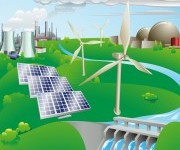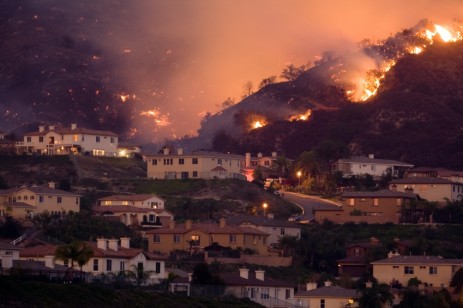carbon emissions
-
Whoops: 2010 had the largest-ever jump in greenhouse emissions
Ugh, you guys, we gotta step it up. Carbon dioxide emissions logged the largest increase on record in 2010, putting greenhouse gas levels above the worst-case scenario predicted four years ago. According to ThinkProgress, that could mean 10 degrees F of warming in this century. Carbon dioxide emissions went up by 6 percent between 2009 […]
-
U.S. carbon emissions down as renewable energy keeps growing
Cross-posted from Earth Policy Institute. Between 2007 and 2011, carbon emissions from coal use in the United States dropped 10 percent. During the same period, emissions from oil use dropped 11 percent. In contrast, carbon emissions from natural gas use increased by 6 percent. The net effect of these trends was that U.S. carbon emissions […]
-
Carbon-eating paint could clean air and strengthen buildings
Okay, now this one really sounds fake: Scientists are working on a carbon-eating paint, which would be capable of turning emissions into limestone. In other words, it would let buildings eat carbon and then use that fuel to grow, like a living thing. The secret is synthetic chemicals that behave like microorganisms. Their creator calls […]
-
Dangerous levels of warming could happen in your lifetime
It's easy for a lot of people to ignore climate change, because it's not going to affect them, it'll only affect their children. If they don't have children, all the better! Who cares! Well, two new research papers in the latest Nature warn that most of the world could be seeing dangerous levels of global warming […]
-
U.S. is freaking out over tiny E.U. carbon tax on air travel
Long ago, in a land far, far away, where it seemed possible that carbon cap-and-trade would be a thing that we all got on board with, the European Union decided it would make sense to include air travel in its carbon trading scheme, because flying on planes is one of the most carbon-intensive activities that humans engage in. But — psych! — turned out no one (*cough* Congress *cough*) really wanted to deal with carbon. The E.U., however, did not get that memo and still wants to charge American airlines for the carbon they emit on their way to Europe. Here's how that's playing out so far:
The U.S. airline industry: NO FAIR! We'll see you in court, suckers!
The European Union: Um, ok, well, they're our courts. -
MythBusters weigh in on motorcycle emissions
You've probably heard that motorcycles are more fuel-efficient than cars, and therefore better for the environment. I mean, they're practically bikes, right? It sounds plausible, but how do you find out if it's really true? The same way you find out if ANYTHING is really true: Ask the MythBusters, obviously.
-
China may emit more carbon per person than U.S. by 2017
China is now the biggest emitter of greenhouse gases in the world, but its per-capita emissions are still less than those of the average U.S. citizen. In six years, that could flip, says a new report from the Netherlands Environmental Assessment Agency that was sponsored by the European Commission. Current U.S. per-capita emissions are 16.9 […]
-
How Congress is turning America into China
Reading news from Washington D.C., while spending a week in China, it seems to me that some members of Congress are backing policies that would make America much more like China — without any of the economic benefits. The House voted last week 249 to 169 to curtail the EPA’s ability to reduce air pollution […]
-
Engineers: We have all the tech we need to cut carbon
Apparently the world's engineers are getting sick of being told that cutting emissions is an engineering problem. Eleven of the biggest engineering organizations have released a joint statement saying, in effect, "You want carbon cuts? We can give you carbon cuts. Just say the word, smart guy."
We already have all the tech necessary to cut emissions 85 percent by 2050, say the engineers. What we don't have is support from governments -- laws that prioritize carbon reduction, and funding to put the technology into action.







